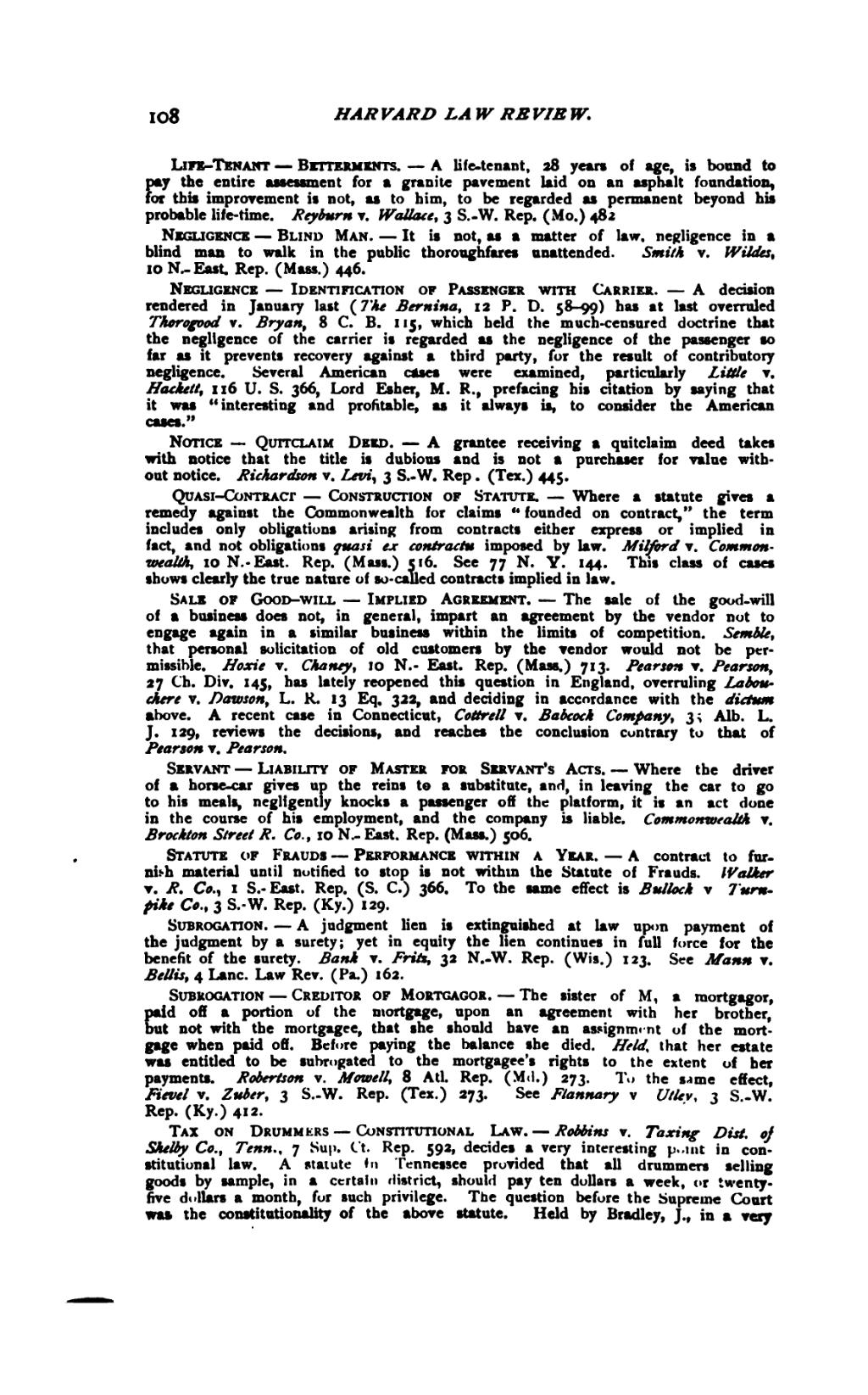Life-Tenant — Betterments. — A life-tenant, 28 years of age, is bound to pay the entire assessment for a granite pavement laid on an asphalt foundation, for this improvement is not, as to him, to be regarded as permanent beyond his probable life-time. Reyburn v. Wallace, 3 S.-W. Rep. (Mo.) 482
Negligence — Blind Man. — It is not, as a matter of law, negligence in a blind man to walk in the public thoroughfares unattended. Smith v. Wildes, 10 N.-East. Rep. (Mass.) 446.
Negligence — Identification of Passenger with Carrier. — A decision rendered in January last (The Bernina, 12 P. D. 58–99) has at last overruled Thorogood v. Bryan, 8 C. B. 115, which held the much-censured doctrine that the negligence of the carrier is regarded as the negligence of the passenger so far as it prevents recovery against a third party, for the result of contributory negligence. Several American cases were examined, particularly Little v. Hackett, 116 U. S. 366, Lord Esher, M. R., prefacing his citation by saying that it was “interesting and profitable, as it always is, to consider the American cases.”
Notice — Quitclaim Deed. — A grantee receiving a quitclaim deed takes with notice that the title is dubious and is not a purchaser for value without notice. Richardson v. Levi, 3 S.-W. Rep. (Tex.) 445.
Quasi-Contract — Construction of Statute. — Where a statute gives a remedy against the Commonwealth for claims “founded on contract,” the term includes only obligations arising from contracts either express or implied in fact, and not obligations quasi ex contractu imposed by law. Milford v. Commonwealth, 10 N.-East. Rep. (Mass.) 516. See 77 N. Y. 144. This class of cases shows clearly the true nature of so-called contracts implied in law.
Sale of Good-Will — Implied Agreement. — The sale of the good-will of a business does not, in general, impart an agreement by the vendor not to engage again in a similar business within the limits of competition. Semble, that personal solicitation of old customers by the vendor would not be permissible. Hoxie v. Chaney, 10 N.-East. Rep. (Mass.) 713. Pearson v. Pearson, 27 Ch. Div, 145, has lately reopened this question in England, overruling Labouchere v. Dawson, L. R. 13 Eq. 322, and deciding in accordance with the dictum above. A recent case in Connecticut, Cottrell v. Babcock Company, 35 Alb. L. J. 129, reviews the decisions, and reaches the conclusion contrary to that of Pearson v. Pearson.
Servant — Liability of Master for Servant’s Acts. — Where the driver of a horse-car gives up the reins to a substitute, and, in leaving the car to go to his meals, negligently knocks a passenger off the platform, it is an act done in the course of his employment, and the company is liable. Commonwealth v. Brockton Street R. Co., 10 N.-East. Rep. (Mass.) 506.
Statute of Frauds — Performance within a Year. — A contract to furnish material until notified to stop is not within the Statute of Frauds. Walker v. R. Co., 1 S.-East. Rep. (S. C.) 366. To the same effect is Bullock v. Turnpike Co., 3 S.-W. Rep. (Ky.) 129.
Subrogation. — A judgment lien is extinguished at law upon payment of the judgment by a surety; yet in equity the lien continues in full force for the benefit of the surety. Bank v. Fritz, 32 N.-W. Rep. (Wis.) 123. See Mann v. Bellis, 4 Lanc. Law Rev. (Pa.) 162.
Subrogation — Creditor of Mortgagor. — The sister of M, a mortgagor, paid off a portion of the mortgage, upon an agreement with her brother, but not with the mortgagee, that she should have an assignment of the mortgage when paid off. Before paying the balance she died. Held, that her estate was entitled to be subrogated to the mortgagee’s rights to the extent of her payments. Robertson v. Mowell, 8 Atl. Rep. (Md.) 273. To the same effect, Fievel v. Zuber, 3 S.-W. Rep. (Tex.) 273. See Flannery v. Utley, 3 S.-W. Rep. (Ky.) 412.
Tax on Drummers — Constitutional Law. — Robbins v. Taxing Dist. of Shelby Co., Tenn., 7 Sup. Ct. Rep. 592, decides a very interesting point in constitutional law. A statute in Tennessee provided that all drummers selling goods by sample, in a certain district, should pay ten dollars a week, or twenty-five dollars a month, for such privilege. The question before the Supreme Court was the constitutionality of the above statute. Held by Bradley, J., in a very

